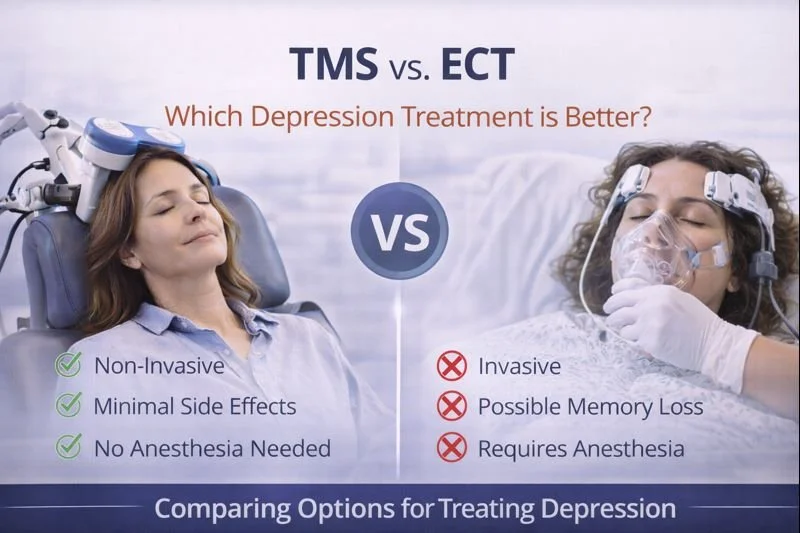TMS vs. ECT (Electroconvulsive Therapy): Which Depression Treatment Is Better?
Understanding Depression Treatments: TMS vs. ECT
If you've tried multiple antidepressants and years of therapy with little success, you're not alone. Many individuals across Boston—from Brookline to Back Bay, Cambridge to Somerville—struggle with treatment-resistant depression.
Two of the most effective options available today are Transcranial Magnetic Stimulation (TMS) and Electroconvulsive Therapy (ECT). But how do they compare? Which is safer, more effective, or better for your lifestyle?
Let’s break it down to help you make an informed decision.
What Is TMS?
TMS (Transcranial Magnetic Stimulation) is a non-invasive treatment that uses magnetic fields to stimulate nerve cells in the brain, specifically targeting the prefrontal cortex—an area involved in mood regulation.
Key Features of TMS:
FDA-approved for treatment-resistant depression
Non-invasive and drug-free
Performed in an outpatient setting
No anesthesia required
Minimal side effects (usually scalp discomfort or headache)
Patients can resume normal activities immediately
At Dignity Brain Health in Brookline, we specialize in offering this cutting-edge therapy to patients throughout the Boston area.
What Is ECT?
ECT (Electroconvulsive Therapy) is a more intensive procedure involving electrical stimulation of the brain while the patient is under general anesthesia. It has been used for decades to treat severe depression, especially when other treatments fail.
Key Features of ECT:
Performed under general anesthesia in a hospital setting
Requires fasting and medical clearance
Typically administered 2-3 times per week for several weeks
Can cause temporary memory loss or confusion
Often used for severe depression, catatonia, or bipolar disorder
ECT is available at several major Boston institutions, including Massachusetts General Hospital and McLean Hospital.
Comparing Effectiveness
Both TMS and ECT are effective, but their use depends on individual needs and clinical history.
Clinical Evidence:
A landmark study found that ECT has a slightly higher initial response rate (70-90%) than TMS (50-60%) for severe, psychotic, or catatonic depression (UK ECT Review Group, 2003).
However, TMS is often preferred by patients due to fewer side effects and lower impact on memory (Perera et al., 2016).
When TMS May Be a Better Fit:
You're looking for a non-invasive treatment
You want to avoid memory-related side effects
You're able to commit to daily sessions over several weeks
When ECT Might Be Necessary:
You have severe, psychotic, or life-threatening depression
Other treatments have completely failed
You need a rapid response for suicidal ideation
Safety and Side Effects
TMS Side Effects:
Scalp discomfort during treatment
Mild headache
Rare risk of seizure (less than 0.1%)
ECT Side Effects:
Short-term memory loss
Confusion post-treatment
Requires anesthesia, with associated risks
Temporary muscle aches or jaw discomfort
Many Boston-area patients choose TMS for its gentler profile and ability to return to daily life right after treatment.
Cost and Insurance Coverage in Boston
Both treatments are covered by most major insurers in Massachusetts, including:
Blue Cross Blue Shield of MA
Harvard Pilgrim
Tufts Health Plan
MassHealth
TMS at Dignity Brain Health:
We offer free insurance verification, flexible financing, and a personalized care plan. Visit our contact page to get started.
Patient Experience: What to Expect
When considering depression treatment, knowing what your day-to-day experience will be like is essential. Both TMS and ECT can be highly effective for treatment-resistant depression, but the logistics and experience of each are quite different.
TMS Sessions: A Daily Routine That Fits Your Life
Sessions last around 20 minutes
Conducted 5 days a week for 4–6 weeks
You are fully awake and alert throughout
No anesthesia or sedation required
Resume work, errands, or social activities immediately after each session
TMS is typically performed in an outpatient setting—like at Dignity Brain Health in Brookline—making it incredibly convenient for those who live or work in Cambridge, Newton, Somerville, or Back Bay. Because it requires no recovery time, many patients schedule morning or lunchtime appointments and head right back to their day.
ECT Sessions: More Involved and Hospital-Based
Typically conducted in a hospital or surgical center
Requires preparation, anesthesia, and post-treatment monitoring
Often performed 2–3 times per week for several weeks
Patients are unconscious during the procedure
May need assistance with transportation due to anesthesia
Potential memory-related side effects during and after treatment
While ECT can be life-saving for severe or catatonic depression, it involves more intensive planning, time off from work, and support during recovery. It may also require coordination with facilities like Massachusetts General Hospital or McLean Hospital in the Boston area.
In short, TMS is ideal for patients seeking effective care that doesn’t disrupt their daily responsibilities, especially in busy urban environments like Boston. TMS offers flexibility without compromising effectiveness.
Trusted Mental Health Resources in Boston
Whether you're weighing your options or ready to start treatment, these resources can help:
Visit Us in Brookline
Conveniently located in Brookline, Dignity Brain Health is easily accessible from Boston University, Harvard Square, and the Longwood Medical Area.
Dignity Brain Health - TMS Therapy Clinic
Take the Next Step
If you're considering TMS or ECT, let us help you navigate the journey. Contact Dignity Brain Health for a consultation. Whether you're in Cambridge, Back Bay, or Allston, hope is just a call away.
Leave a comment below or call us to learn more about personalized depression treatment options.
References
Perera, T., George, M. S., Grammer, G., Janicak, P. G., Pascual-Leone, A., & Wirecki, T. S. (2016). The Clinical TMS Society Consensus Review and Treatment Recommendations for TMS Therapy for Major Depressive Disorder. Brain stimulation, 9(3), 336–346. https://doi.org/10.1016/j.brs.2016.03.010
UK ECT Review Group (2003). Efficacy and safety of electroconvulsive therapy in depressive disorders: a systematic review and meta-analysis. Lancet (London, England), 361(9360), 799–808. https://doi.org/10.1016/S0140-6736(03)12705-5
—
CONTACT INFO:
DIGNITY BRAIN HEALTH
1101 BEACON STREET, SUITE 8W
BROOKLINE, MA, 02446
UNITED STATES
Phone: (617) 855-7288

